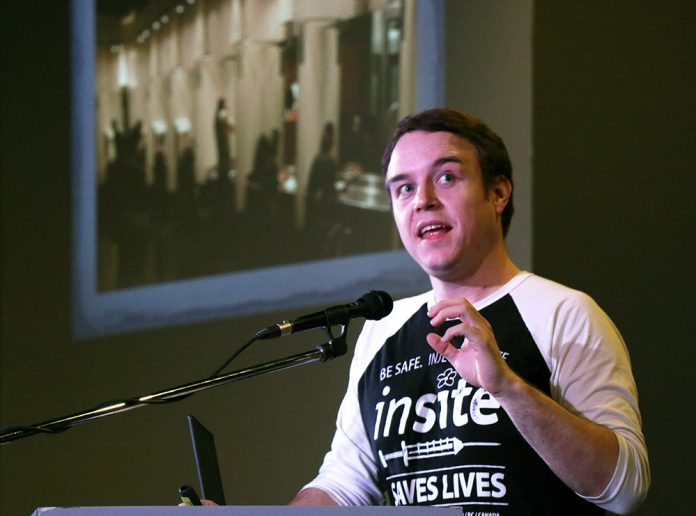
Prince Albert should open a safe injection site before a bad situation gets worse, says a senior staff member from Canada’s first legal facility for injecting drugs.
Tim Gauthier, clinical coordinator at Vancouver’s Insite, was the keynote speaker at the Prince Albert Parkland Health Region’s HIV Education for Change event on Wednesday. He said he was shocked when he heard how many drug users in the Prince Albert area are contracting HIV through needles. The numbers convinced him that the city needs to expand its harm reduction programs.
“For me it’s not even a question,” Gauthier said. “When I heard about the 70 per cent of people who are HIV positive and are injection drug users, I just couldn’t believe that more hadn’t been done.”
The Prince Albert Parkland Health Region recorded 56 new HIV cases in 2016, according to preliminary data. That’s 73 per cent higher than the average for the ten years prior. The majority of new cases come from injection drug use.
Gauthier shared statistics from Vancouver’s Downtown Eastside, where Insite helped reduce the proportion of HIV positive injection drug users from 35 to 17 per cent. He also stressed that Vancouver is dealing with a massive increase in overdose deaths – but no one has ever died of an overdose at Insite.
Prince Albert isn’t Vancouver, of course. Vancouver has far more drug users, and far more resources. But Gauthier said that any community can run a supervised site. It doesn’t take much to prevent drug users from overdosing.
“It’s a simple thing to do,” he said. “If something happens, I’m here. I can either intervene or call for help. Already, your chance of surviving this event is so much higher than it was before.”
He acknowledged that Prince Albert has not yet faced the kind of crisis Vancouver is dealing with, an epidemic triggered by the easy availability of the powerful opiate fentanyl on the city’s streets. But he said it makes no sense to wait for tragedy to strike.
“It hit us really hard, really fast,” he said. “And it’s really unfortunate that we were reactionary to that.”
When asked directly whether Prince Albert should move to open a safe injection site, his answer was clear: “a big fat yes.”
Gauthier spoke just after presentations from Patrick McDougall of Vancouver’s Dr. Peter Centre and a representative of Saskatoon’s Sanctum. The Dr. Peter Centre actually started a safe injection site before Insite opened its doors, but without a federal exemption from the Controlled Drugs and Substances Act. In other words, it was illegal.
McDougall told the conference how the centre provides a full range of services to people living with HIV and AIDS. It offers art therapy, music therapy, acupuncture, supportive housing and an extremely popular food program. It’s unlikely Prince Albert could support something quite so ambitious, but McDougall said there are plenty of models that work for smaller communities.
“If the community interest and the community compassion is there, the models will follow,” he told reporters after his speech. “Prince Albert is going to get something that’s right for Prince Albert.”
He agreed with Gauthier that Prince Albert clearly has an infectious disease problem, and suggested that harm reduction can help. McDougall said it’s important to reflect on what could work best – but not to overstudy the issue. He said the solutions are already out there.
“We don’t need to wait until an overdose crisis hits,” he said.
Councillor Evert Botha sat at the back of the hall at Plaza 88 for much of the conference. He has long been calling for an expansion of harm reduction services in Prince Albert, including a supervised injection site, and recently pushed a motion of support through council.
He said he found the turnout at Wednesday’s event “encouraging,” and suggested that more people are warming to the idea.
“I think a lot of people are slowly but surely getting onto the same page,” he said. “We are very different in our needs from Vancouver or Montreal, but this same approach to harm reduction applies here.”
Botha said the plan to bring a safe injection site to Prince Albert is still slowly inching forward. At this point, proponents are waiting to secure a letter from Saskatchewan’s minister of health.
For more on this story, see the Friday, October 18 print or e-edition of the Daily Herald.

